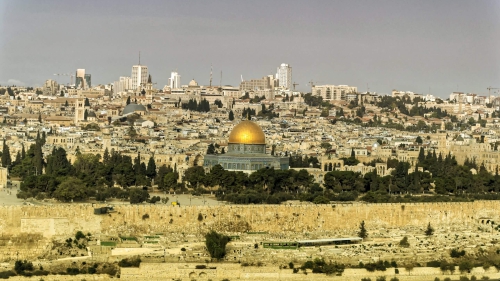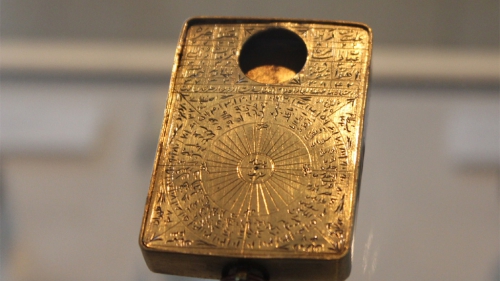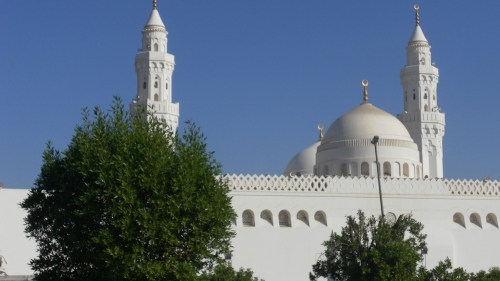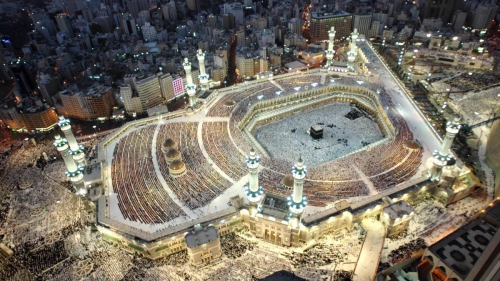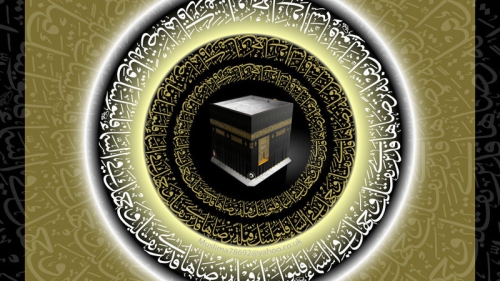The Significance of the Two Qiblahs
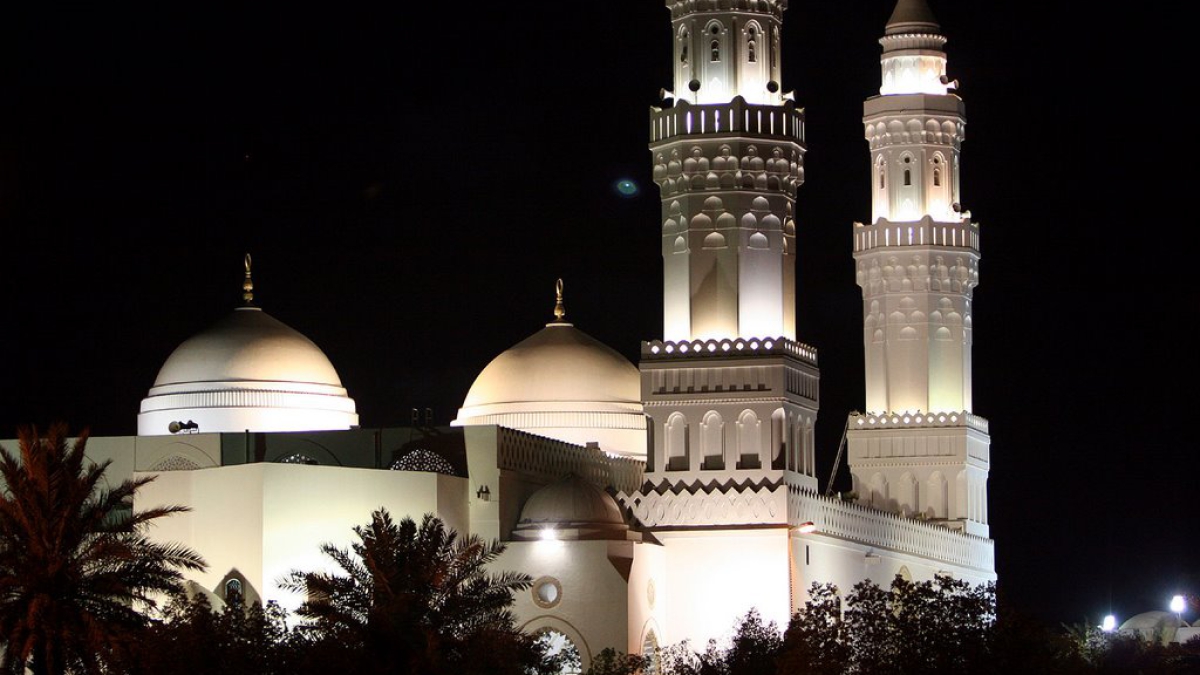
It was on account of the remarkable historical importance of the al-Masjid al-Aqsa - a mosque associated with a number of major prophets -- that it served as the first qiblah (direction of prayer) to Prophet Muhammad (pbuh) and his followers for about 18 months following the migration from Makkah to Madinah. After that, the qiblah was shifted towards the al-Masjid al-Haram in Makkah. Having faced in his prayers the two most ancient, and historically speaking the most significant, mosques on earth, Prophet Muhammad (pbuh) thus acknowledged the validity and truthfulness of all the previous prophets and messengers and the original messages that had been revealed to them. In point of fact, moreover, believing in the earlier prophets and their original revelations constitutes one of the pillars of the message or the revelation revealed to Prophet Muhammad (pbuh). Denying any earlier prophet, or any revelation of the original revelations, Islam views as a blasphemous act which rescinds one's association with Islam and Prophet Muhammad (pbuh) rendering him a non-Muslim.
Facing from Madinah, the epicenter of the operations of the last prophet to mankind, firstly the al-Masjid al-Aqsa in Jerusalem and then the al-Masjid al-Haram in Makkah also indicated the ultimate vindication of the two mosques' spiritual and historical standings and roles at the hands of the seal of prophets, as well as the commencement of their total purification, also at the hand of the last prophet and his followers, of all the impurities with which the two mosques' names and purposes had been often in history gravely stained and defiled. This was so because as the seal of prophets, Prophet Muhammad's task was not only to look at the present, as well as to the future, and chart the courses for people's moral and spiritual fulfillment. It was also to look back at the past where the tawhidic (God's Oneness) schemes of other prophets have been corrupted and tampered with, setting the things right and occasionally naming the culprits. That way, the struggles, achievements and legacies of prophets, their followers and whoever wished and contributed any good to the spiritual and civilization enrichment of mankind have been duly recognized and endorsed. At the same time, the falsehood and deceptive plots of the opponents of prophets and of the truth of Islam which they all brought were unmistakably exposed and resolutely repudiated.
Thus, the direction and tone of the last Allah's revelation to man were clearly set. The chief objectives of the last Prophet's mission were also clearly spelled out. According to such objectives, the last Prophet (pbuh) was as much a reformer as an originator. He was concerned as much about the present and future as about the past. He came as much to initiate some new systems of living as to Islamize some existing but flawed ones. Even though he laid a foundation for a new divinely inspired and universal civilization, yet he never failed to acknowledge the righteous aspects of the existing cultures and civilizations that he came into contact with. Although he strongly rejected the immoral and corrupt aspects of the existing cultures and civilizations, yet whenever needed he never failed to avail himself of their positive and intrinsically innocent contributions to the good of mankind. This was possible due to Islam's recognition that every community is capable of making a contribution to the wellbeing of human society. The basis for such contributions could be either some remnants of a past prophet's wisdom and experience, which the people may or may not be aware of, or the human reasoning power supported by the human unadulterated primordial nature which Allah has bestowed upon man as a gift. And finally, Prophet Muhammad (pbuh) was an Arab operating within an Arab context, but the teachings which have been revealed to him were universal and timeless meant for all people from whatever religious, social, cultural or economic backgrounds they might be.
However, while operating from the Madinah epicenter, and while facing in his prayers firstly the al-Masjid al-Aqsa in Jerusalem and then the al-Masjid al-Haram in Makkah, in the process creating his own mosque in Madinah which in terms of spiritual worth trailed the al-Masjid al-Haram but surpassed the al-Masjid al-Aqsa, Prophet Muhammad (pbuh) sent another perhaps most powerful message to the world. That message was to the effect that although Prophet Muhammad (pbuh) acknowledged and endorsed all the former prophets and their original revelations or holy books, it was only his prophethood and his holy book (the Qur'an) that were binding on all people till the end of days. It was only his message that was universal, everlasting and all-encompassing, authenticating and incorporating the tawhidic spirit and essence of all the preceding messages and revelations. All the past prophets and their holy messages were binding only on a particular group of people and during a particular period of time. It is true that the former revealed books have all been distorted and corrupted beyond recognition, nonetheless, even if such was not the case and they had been preserved in their original forms and existed as such at the time of Prophet Muhammad (pbuh), those holy books and the prophethoods of their holy messengers would still have been subjected to the process of total abrogation by Prophet Muhammad's mission and his holy book, the Qur'an. Such was the Will of Allah the Conceiver and Creator of life, the Selector and Sender of all prophets, and the Author and Source of all the holy messages and books ("...The East and the West (i.e., all qiblahs) belong only to Allah; He guides whom He likes to the right path...", al-Baqarah, 142).
The Prophet (pbuh) once remarked about this verity: "If Musa (Moses) were alive amongst you, he would have had no option but to follow me." He also said: "By the One in Whose Hands is my soul, if Musa (Moses) were to come to you and you followed him, and not me, you would go astray." Furthermore, it is a Muslim tenet that prophet 'Isa (Jesus) was neither killed nor crucified. Allah took him up to Himself. However, when the Day of Judgment draws near, prophet 'Isa will descend again to the earth to fulfill one of the greatest and most dramatic prophecies. His descent will signify a great sign of the nearness of the Day of Judgment. While on the earth, for the second time, prophet 'Isa will follow Prophet Muhammad (pbuh) and will live according to the principles and teachings of his Qur'an and the Islamic Shari'ah (law). At the end, after his death, 'Isa is said will be buried near Prophet Muhammad (pbuh), as yet another attestation to the latter's status and authority as the final prophet whose precursor prophet 'Isa was announcing his coming.
It stands to reason, therefore, that Prophet Muhammad's treatment of the two earliest mosques on earth - solely as instructed and guided by Allah's directives - contained an amount of an ideological flavor whereby it has been alluded to the ways the legacies of the past prophets were to be regarded and dealt with. This was especially relevant in connection with the al-Masjid al-Aqsa in Jerusalem because it was linked with the Children of Israel a great number of whom have lived in Madinah proper and in some of the city's immediate and distant vicinities. The Prophet (pbuh) and the first Muslims had to deal with them in a variety of ways employing a variety of methods and means. Some of those methods and means needed to accentuate a historical dimension featuring the major prophets of the Children of Israel and of course the al-Masjid al-Aqsa and its historical and current repute. In that way, Prophet Muhammad (pbuh) demonstrated to the Children of Israel how much historically and ideologically they are, and still can be, related to Muslims, inviting them to join them, to follow the final revelation and the final prophet of Allah, and thus to become members of the fellowship or the brethren of Islam and Muslims. If not, though absolutely protected, given their rights, and respected as fellow citizens and fellow human beings, they will always be just "the outsider" or "the other" party or group. Instead of becoming members of the community of Islam and its universal brotherhood, the Children of Israel will always be just ahl al-kitab, or the People of the Book. But the Book in question is their own Book - or Books - which they themselves had tampered with and tossed aside, thus calling firstly for its exoneration and then its outright abrogation, and not the Book of the last messenger of Allah, i.e., the Qur'an, which was then and which will remain the only pure, untouched and legitimate divine reference available on the earth. Surely, if the Children of Israel, or the People of the Book, really followed their Book(s), they would have ended up following Muhammad (pbuh) and his Book as well, as the two in essence are one and the same, the latter even though abrogating, yet it authenticated and fulfilled the former. However, since they vehemently opposed and rejected Muhammad (pbuh) and his Book, that meant that they in equal measure vehemently opposed, rejected and remained unfaithful to their own Book(s) and prophets. Thus, the tag and title of ahl al-kitab (the People of the Book) is as much a charge of treachery and perfidy as it is recognition of a position or a status. There is certainly nothing in it to be really proud of, or to seek solace from.
Through the prism of the theme of the qiblah, Allah asserts concerning the relationship between Muslims and the Children of Israel, or those who have been given but have corrupted and altered their Book(s): "The fools among the people will say: What has turned them from their qiblah which they had? Say: The East and the West belong only to Allah; He guides whom He likes to the right path." (al-Baqarah, 142)
"And even if you bring to those who have been given the Book every sign they would not follow your qiblah, nor can you be a follower of their qiblah, neither are they the followers of each other's qiblah, and if you follow their desires after the knowledge that has come to you, then you shall most surely be among the unjust." (al-Baqarah, 145)
About some of the mischievous deeds of the Children of Israel and how grave such deed were, Allah says: "But on account of their breaking their covenant We cursed them and made their hearts hard; they altered the words from their places and they neglected a portion of what they were reminded of; and you shall always discover treachery in them excepting a few of them; so pardon them and turn away; surely Allah loves those who do good (to others)." (al-Ma'idah, 13)
"And when it is said to them: Believe in what Allah has revealed, they say: We believe in that which was revealed to us; and they deny what is besides that, while it is the truth verifying that which they have. Say: Why then did you kill Allah's Prophets before if you were indeed believers? And most certainly Musa (Moses) came to you with clear arguments, then you took the calf (for a god) in his absence and you were unjust." (al-Baqarah, 91-92)
"O People of the Book! Why do you disbelieve in the Signs of Allah while you witness (them)? O People of the Book! Why do you confound the truth with the falsehood and hide the truth while you know?" (Alu 'Imran, 70-71)
Thus, when all's said and done, it did not really matter, nor could it increase anyone in piety and righteousness, if the people were asked to face a particular qiblah. It likewise did not matter if two different prophets and their respective peoples were instructed to face different qiblahs, because the whole of the earth and all the points of the compass are the creations of Allah belonging only to Him. Hence, as part of divine measures meant for man's guidance and support, Allah determines a prophet's and his people's qiblah as He wills, in line with His omniscience, wisdom and His infinite care and love for His servants. Facing different qiblahs by no means was an act of confusion or hesitancy. Nor was it an act of an intended rivalry or antagonism between people. Facing a qiblah did not make a community innately any better than another community which had to face another qiblah, just on account of facing and being affiliated with a different qiblah. In the same vein, following a prophet did not make anyone intrinsically better than someone else who had to follow another prophet, just on account of following and being associated with a different prophet. Indeed, in terms of their divine honorable missions and in terms of their unparalleled spiritual worth and merit, all the prophets were equal, all their revealed messages were identical, and so were their qiblahs as well. What really mattered were people's genuine piety, righteousness and commitment to the realization of their prophets' callings. In the spiritual kingdom, the substance and the soul always take precedence over sheer appearances. The enlivened quintessence always outweighs deadening symbolism and formalism.
Owing to this Islamic precept, Allah says concerning the flawed perception of the Children of Israel concerning the profundity and the real meaning of the qiblah subject, which they attempted to manipulate for their own vested interests: "It is not righteousness that you turn your faces towards East or West; but it is righteousness -- to believe in Allah and the Last Day, and the Angels, and the Book, and the Messengers; to spend of your substance, out of love for Him, for your kin, for orphans, for the needy, for the wayfarer, for those who ask, and for the ransom of slaves; to be steadfast in prayer, and practice regular charity; to fulfill the contracts which you have made; and to be firm and patient, in pain (or suffering) and adversity, and throughout all periods of panic. Such are the people of truth, the Allah-fearing." (al-Baqarah, 177)
Allah also unequivocally states that no mere association with a prophet, or a revelation, or a qiblah, guarantees a person, or a community, salvation. It all boils down to one's own genuine faith and avid submission. As this applied to all the prophets before Prophet Muhammad (pbuh), it also applies to him and his followers. It goes without saying, therefore, that just being a Muslim and a follower of Prophet Muhammad (pbuh), albeit without shoring up that status with an alliance of faith and deeds, guarantees a person no happy ending on the Day of Judgment. Allah says: "And they say: None shall enter Paradise except he who is a Jew or a Christian. These are their vain desires. Say: Bring your proof if you are truthful. Yes, whoever submits himself entirely to Allah and he is the doer of good (to others) he has his reward from his Lord, and there is no fear for him nor shall he grieve. And the Jews say: The Christians do not follow anything (good), and the Christians say: The Jews do not follow anything (good), while they recite the (same) Book. Even thus say those who have no knowledge, like to what they say; so Allah shall judge between them on the day of resurrection in what they differ." (al-Baqarah, 111, -113)
Dr. Spahic Omer, a Bosnian currently residing in Malaysia, is an Associate Professor at the Kulliyyah of Architecture and Environmental Design, International Islamic University Malaysia. He studied in Bosnia, Egypt and Malaysia. His research interests cover Islamic history, culture and civilization, as well as the history and philosophy of the Islamic built environment. He can be reached at spahico [@] yahoo.com; his blog is at www.medinanet.org.






